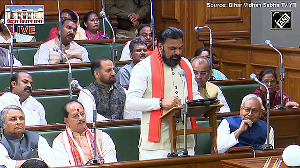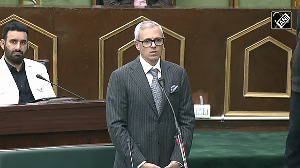Finance Minister P Chidambaram's remark on Friday that inflation is not on an upswing could make the Reserve Bank of India governor Y V Reddy's job of monetary policy review difficult.
While most analysts warn of heightening threat of inflation here and overseas, Chidambaram's comments, four days before the RBI policy review, suggest otherwise.
Tuesday, when Reddy unveils the quarterly policy review, he is widely expected to ramp up the reverse repo tender rate 25 basis to 5.25 per cent to contain inflationary expectations.
In recent weeks inflation here has topped 4.5 per cent, while earlier it was scrapping 3 per cent. Although the latest rate is still below the 5.0-5.5 per cent projected by RBI for March end, it is clear that inflation that had been benign, could threaten many calculations.
Contrary to this, Chidambaram said "The inflation rate is not on an upswing.... It continues to be moderate". It is inflation's threat to growth which forced US, the world's largest economy, to hike the base rate 25 basis points 11 successive times since June 2004.
Policy makers here, while acknowledging the threat from rising prices, have cited greater relevance of domestic factors in monetary measures as a reason for hiking rates by only 50 basis points in that period.
"There were no set patterns for movements in policy interest rates globally and the rates were being set subject to domestic conditions," said Rakesh Mohan, RBI deputy governor, to Business Standard on September 30.
"The Federal Reserve has been raising rates in phases, while the central bank of the UK has now actually cut interest rates, and the European central bank has not changed its policy rates in over two years."
"Hence, it is clear that policy rates are set much more in the specific context of domestic economic conditions and requirements." However, a growing economy, rising inflation and, off late, the fall in the rupee to an 11-month low, do make a strong case for an interest rate hike.
At least so feel most analysts and economists. Analyst say a marginal rate hike of 25 basis points in the Tuesday policy review would have a three-pronged impact -- it won't hurt the economic growth momentum; it would tame inflationary expectations; and it would also stem rupee's fall.
Moreover, the central bank could draw comfort from the fact that the money market has discounted a likely rate hike.
Money markets are impacted immediately when interest rates are revised because the market rates immediately get adjusted accordingly.
But is there a case for the central bank to keep rates at current levels?
On July 26, in its first-ever quarterly review, the central bank, on "balance of convenience" left rates unchanged even as many in the markets expected RBI would opt for a hike.
But, do current economic and monetary conditions provide the same "balance of convenience" to the central bank that would prompt it to maintain its stance?
A section of stakeholders say tightening monetary conditions could impact the ongoing economic buoyancy, particularly of industrial growth.
While agreeing that inflation was worrying, it wasn't a sufficient reason for the RBI to hike a policy rate.
This view draws strength from the fact that despite two rounds of auto fuel prices hikes, the central bank hasn't revised its current financial year inflation and growth forecasts of 5.00-5.50 per cent and around 7 per cent respectively.
Since April, petrol price has been hiked by roughly 5.50 rupees a litre while diesel made dearer by Rs 4 a litre.
Another moot point is what course will the economy and the money market take after the RBI policy review.
If expectations of the bigger market section--for a rate hike--is met, there may not be too many fireworks.
But if the policy rate is left unchanged, there could be many red faces.






 © 2025
© 2025